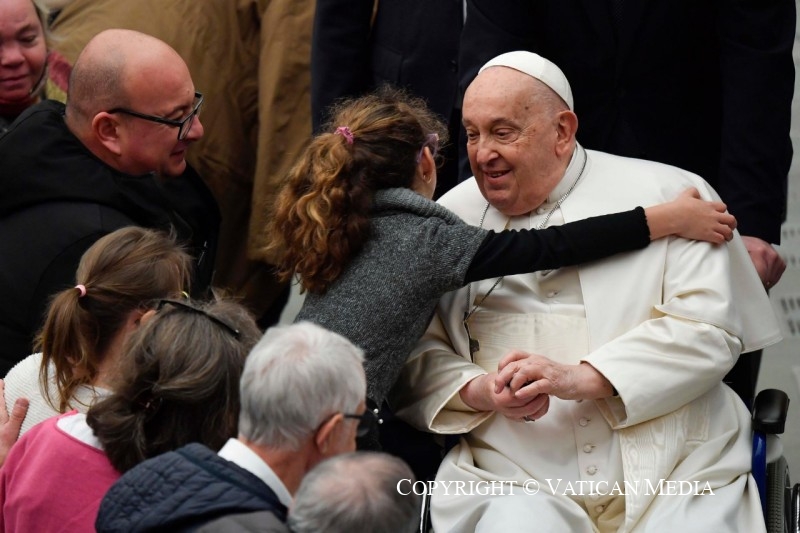Audience: Pope expresses closeness to prisoners of war who suffer torture, an inhumane practice
In St Peter's Square, Pope Francis remembers Palestine, Israel and Ukraine, as well as all the "prisoners of war." Today's catechesis focused on temperance, “the virtue of the right measure”. A sensitive person “does not weep over himself. In defeat, he rises up again; in victory, he is capable of returning to his former reserved life.”
Vatican City (AsiaNews) – Today, as he did on many other occasions, Pope Francis turned his thoughts to “peoples at war".
In his address following the greetings dedicated to the Italian-speaking pilgrims, at the end of the Wednesday General Audience, the pontiff mentioned the Holy Land, citing both Palestine and Israel at a time when tensions are high between Tel Aviv and Tehran. He also remembered is Ukraine, a "tormented” nation, as he usually describes the country at war for the past two years.
Expressing closeness to the pain that imprisons these areas of the world, the pope urged the faithful to think of the "prisoners of war”, and pray: "May the Lord move wills so that they may all be free,” especially those who have been imprisoned and subjected to torture.
The latter is "a horrible thing, it is not human," Francis said. Torture comes in many forms, but they all “wound the dignity of the person." In view of this, the bishop of Rome called on the faithful to dedicate a thought to the “many tortured people.”
During the greetings to the pilgrims and faithful gathered in a sunny St Peter's Square, on a day of mild weather, Francis especially welcomed, among others, the "Josephite religious of Murialdo," and the priests of the dioceses of Milan and Andria, "who celebrate significant anniversaries of priestly ordination, [. . .] encouraging them in their dedication to Christ and in the service of their brethren."
The Holy Father also spoke about “the sick, the elderly, newlyweds, young people," especially students, who "rejoice us with their presence”.
"I wish each of you that as you leave the Eternal City and return to your respective places of living, you will bear witness to a renewed commitment of active faith, thus helping to make the light of the Risen One shine in the world," he said.
Today's audience, starting with the reading (Sir 5:2; 6:4; 14:14), included the catechesis that continues the cycle of in-depth studies on the theme of "Vices and Virtues".
Today Pope Francis focused on temperance, the "fourth and final cardinal virtue”. In the audiences of the previous three weeks, he explored in depth prudence, justice, and fortitude.
With these virtues, temperance shares a “history that goes far back in time and does not only belong to Christians,” the pope explained.
As the ancient Greeks already spoke of practising virtues to obtain happiness, the pontiff noted that in Aristotle's treatise on ethics dedicated to his son Nicomachus, there is room for Enkráteia (ἐνκράτεια), temperance, which in Greek literally means "self-mastery”.
“This virtue is thus the capacity for self-mastery, the art of not letting oneself be overcome by rebellious passions, of establishing order in what Manzoni calls ‘the jumble of the human heart’.”
Taking one step further, Francis noted that this cardinal virtue is found in the Catechism of the Catholic Church, where “temperance is the moral virtue that moderates the attraction of pleasures and provides balance in the use of created goods”.
It is, the pope said, "the virtue of the right measure”; seizing it helps to be a trustworthy person.
“In a world where many people boast about saying what they think, the temperate person instead prefers to think about what he says.” Indeed, a temperate person "acts judiciously," and avoids "losing the taste for everything."
“It is better, then, to seek the right measure: for example, to appreciate a good wine – to taste it in small sips is better than swallowing it all in one go.”
Another trait of those who use temperance is also knowing how to "weigh words and dose them well”, not let anger overwhelm oneself.
Yet, “If the temperate person knows how to control his own irascibility, this does not mean we always find him with a peaceful and smiling face,” Pope Francis explained.
Ultimately, temperance is expressed in “Gospel values such as smallness, discretion, modesty, meekness.” Thus, the temperate person is not afraid to show his fragility or emotions.
Such a person “is sensitive, he is able to weep and is not ashamed, but he does not weep over himself. In defeat, he rises up again; in victory, he is capable of returning to his former reserved life. He does not seek applause but knows that he needs others,” the pontiff said.
In concluding, the Holy Father called upon the Lord to give us the "gift" of "emotional" and "social" maturity.
27/03/2024 16:20
29/05/2024 16:39







.png)










